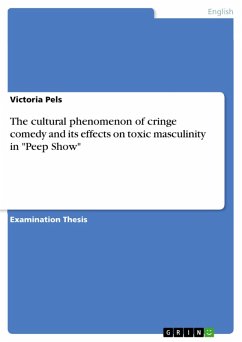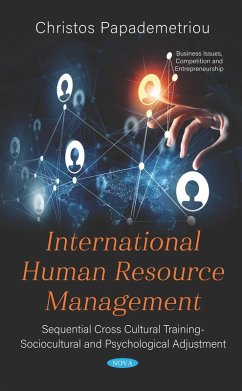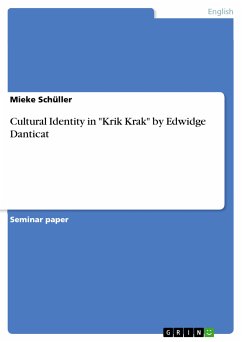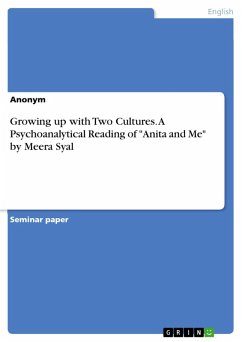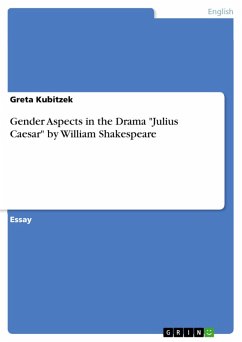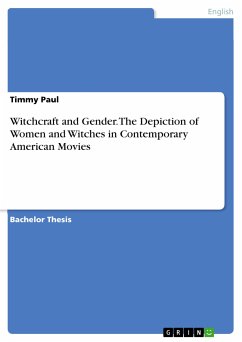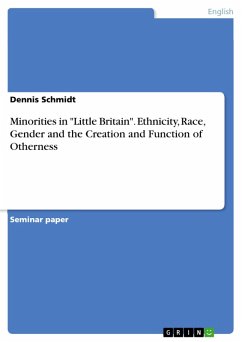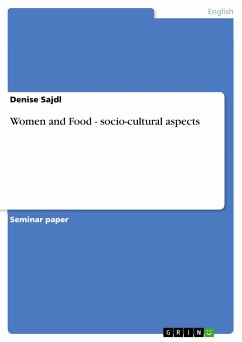
Women and Food - socio-cultural aspects (eBook, PDF)

PAYBACK Punkte
0 °P sammeln!
Seminar paper from the year 2006 in the subject English Language and Literature Studies - Culture and Applied Geography, grade: 1,3, Ruhr-University of Bochum (Englisches Seminar), course: Food and Identity, language: English, abstract: Food is life. It touches everything, reveals our identities and marks social differerences. Our three basic needs as human beings are love, security and food. The act of eating is something which is present all over the world, at any time. It is an endlessly evolving enactment of family, community relationships and - which is most important for this paper - of ...
Seminar paper from the year 2006 in the subject English Language and Literature Studies - Culture and Applied Geography, grade: 1,3, Ruhr-University of Bochum (Englisches Seminar), course: Food and Identity, language: English, abstract: Food is life. It touches everything, reveals our identities and marks social differerences. Our three basic needs as human beings are love, security and food. The act of eating is something which is present all over the world, at any time. It is an endlessly evolving enactment of family, community relationships and - which is most important for this paper - of gender. In this paper I want to discuss the powerful and fascinating relation between food and gender by showing in how far women can be studied and understood through food. How do women define themselves through their foodways? What distinguishes them from men in this special context? I also want to show how women across cultures often speak through food and appetite and try to examine some of the meanings of eating, dieting and being thin in women¿s lives. These meanings extremely differ between men and women and therefore are closely linked to cultural images of masculinity and femininity. But in contrast to men, women have a special relationship to food: whereas men can mainly be characterized as food consumers, women have a dual function: they are foodconsumersas well as foodpreparers.Thus, the paper at hand not only wants to examine the aspect of women as food consumers but also their traditional role as primary food preparers. What powers do women gain and lose through their dominance and control over food preparation and distribution? Another important aspect when dealing with women and food would be the relationship to their bodies. How does the objectification of the female body subordinate women, and how can women challenge it? Thus, in chapter 3 I will examine the connections of food, female body image and culture. As Carole Counihan and Penny van Esterik both say in their introduction, food is both a scholarly concern and a real-life concern. Food studies has an interdisciplinary nature. This is why so many scholarly disciplines such as cultural studies, anthropology, sociology, history, philosophy and literary criticism developed an interest in food studies over time. But food has ever since fascinated the general public, too. In this paper, I will try to examine anthropological, cultural, sociological and even some historical aspects to discuss the relationship between women and food. Because food-sharing can be seen as an important medium for social relations, according to Counihan and van Esterik food refusal and fasting have powerful social and symbolic weight.
Dieser Download kann aus rechtlichen Gründen nur mit Rechnungsadresse in A, B, BG, CY, CZ, D, DK, EW, E, FIN, F, GR, HR, H, IRL, I, LT, L, LR, M, NL, PL, P, R, S, SLO, SK ausgeliefert werden.




